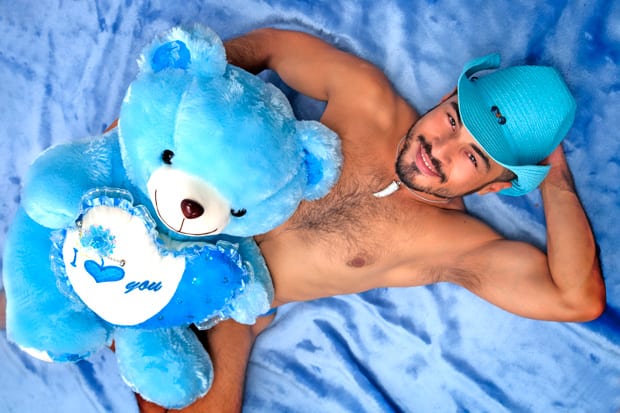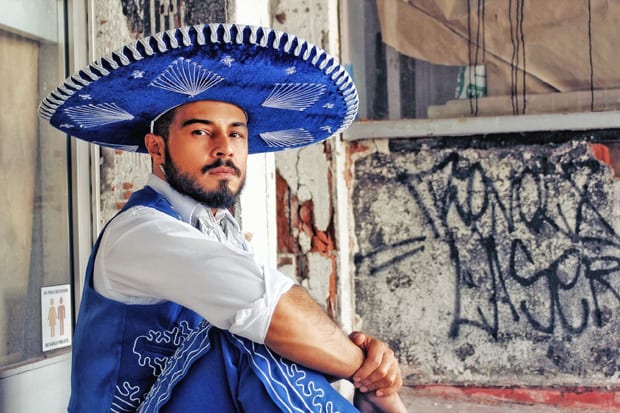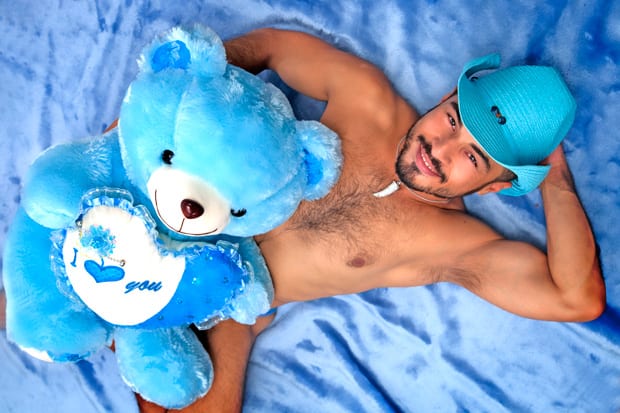Sexy, smart ‘Cha Cha Bitch’ sensation AB Soto makes his Dallas debut at Down To Float 2

You might not expect a musician best known for two-stepping in a hot-pink Bedazzled tuxedo in Cuban heels to have a subversive philosophy about the essence of masculinity and Latin stereotypes, but that’s just because you’ve never talked to AB Soto.
When he hit it big last year with his single “Cha Cha Bitch,” Soto became a darling of the club kid set, with a color video of pulsing beats that sent out a message of pure joy and attitude. But dig deeper, and there is some thoughtfulness behind the disco ball.
“I made a conscious decision to be more Latin [on my last album]. The first was more rappy and the second more underground,” he says.
That has meant a progression of his musicianship, one that is as colorful as a flamingo but as rooted in dance music, rap, even the sounds of the barrio in a uniquely spicy combination. “Why can’t someone from East L.A. be multidimensional?” he asks. And the answer — gleaned from his work — is: “They can.”
Wanna see for yourself? Soto will be performing this weekend in Dallas at Down to Float 2, the second annual pool party and fundraiser presented by Impulse Group, that will also feature DJ Brandon Moses, Stoli cocktails and a runway show, dancers, a VIP lounge and more. We chatted with him before his Dallas debut about his musical influences, his Mexican heritage and what audiences can expect from a real live “Cha Cha Bitch.”

SOTO FLOATO | AB Soto says his mariachi outfit is not meant to mock, but to celebrate, his Latin heritage.
Dallas Voice: Like Lady Gaga, your work seems to combine fashion and music. AB Soto: As a kid, I would sing and dance in my bedroom, but I didn’t know it was something you could do as a professional, so I studied fashion first. I only went to fashion school because I thought there was a lack of fashion to represent myself. I took some time off from that to pursue dance, because I felt the need to follow that. But the fashion always stayed with me — I’ve always been about rebelling against all rules and stereotypes. Fashion has always been a silent performance. [Fashion, music and dance] combined are my paintbrushes.
 You certainly seem to undercut expectations about Latino culture. Your style seems to bridge the divide between macho Hispanic men and a flamboyant drag sensibility. You pretty much nailed it. [There’s a stereotype] that Latino men have to be a certain way. People would say to me, “You can’t be openly gay in music; you can’t rap because you’re not masculine enough.” But since I was little, there were all these rules I had to abide by and follow … and I don’t do well with that. When I was little, my dad would put us in these [traditional Mexican clothes] and put us in these hats. It was a really grand time, and me and my brother loved wearing that stuff, but other kids were like, “That’s so ethnic! Everyone will make fun of you.” So wearing the mariachi outfit [in my act] isn’t about me making fun of [my Mexican heritage], I just like to take a new spin on it. The fact I dance feminine is what some macho Latino gay men have a problem with, especially when I’m in that outfit. If I was dancing like a straight man — whatever that is — you wouldn’t have a problem with it. That’s homophobia.
You certainly seem to undercut expectations about Latino culture. Your style seems to bridge the divide between macho Hispanic men and a flamboyant drag sensibility. You pretty much nailed it. [There’s a stereotype] that Latino men have to be a certain way. People would say to me, “You can’t be openly gay in music; you can’t rap because you’re not masculine enough.” But since I was little, there were all these rules I had to abide by and follow … and I don’t do well with that. When I was little, my dad would put us in these [traditional Mexican clothes] and put us in these hats. It was a really grand time, and me and my brother loved wearing that stuff, but other kids were like, “That’s so ethnic! Everyone will make fun of you.” So wearing the mariachi outfit [in my act] isn’t about me making fun of [my Mexican heritage], I just like to take a new spin on it. The fact I dance feminine is what some macho Latino gay men have a problem with, especially when I’m in that outfit. If I was dancing like a straight man — whatever that is — you wouldn’t have a problem with it. That’s homophobia.
It’s not just in the shiny spectacle of your performance, but also in your lyrics, which go into a kind of Spanglish. Do you think of it as a mashup of cultures? Are you consciously trying to create something new — gay, Mexican, feminine but with a hairy-chested sexuality? I wouldn’t say it’s intentional — it’s just who I am. Just because I am Latino doesn’t mean I listen to one kind of music. That’s where we’re stuck [as a society]: “You’re white, so you listen to country.” I speak English and I know how to speak Spanish.
Hollywood wanted me to be Latin in a specific way, but if I was to be signed by a major label now, they would want me to be “the new Ricky Martin” or “the new Enrique Iglesias”… what does even the mean? I sing all in Spanish? I don’t’ like to be pigeonholed.
What’s the difference between Hispanic gays in Los Angeles, Texas, Florida…? Growing up in East L.A., it wasn’t cool to be brown. You come to the states and you Americanize yourself and try to get away from what makes you Mexican. You find yourself in this realm where you’ve tried to erase your roots and what makes you you. I wanted to go back and touch on those things that I was made to feel embarrassed about and embrace that. L.A. is pretty progressive about owning your brownness. In Texas, I get a whole different dialogue. Texas is embracing, but you get that one person who doesn’t really understand it. It’s like I’m making them come out of the closet once again, but in their heritage: “Wait a minute are you making fun of my culture?” That’s the real interesting dialogue that needs to be had. Why would someone owning their heritage want to put it down?
What can people in Dallas expect from your live performance? A lot of people love my videos, but the live show is where it’s at. I’m a trained dancer and I love to be onstage. I’ll have two backup dancers and perform like eight songs with lots of costume changes. I don’t think people who have not seen me live had the full AB Soto experience.
This article appeared in the Dallas Voice print edition July 22, 2016.














